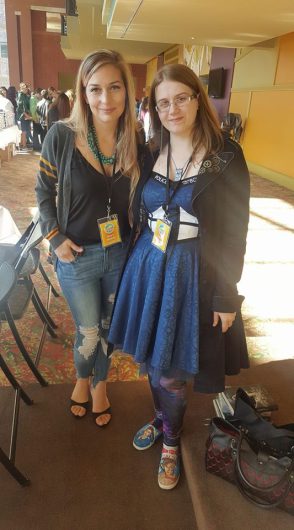I enjoy discussing pedagogy, hence my participation in this site. At the start of every semester, as I go over the syllabus with my students, I create a space for us to discuss why I have made the decision I have for our course. We discuss text choices and order. We discuss assignments and scaffolding. In other words, we don’t just go over the syllabus, we discuss my pedagogical rationale. Students generally feel comfortable engaging with me right of the bat, and they question some of my decisions which leads to further discussion.
I will talk teaching and pedagogy all day long! Why not? It makes us better instructors. This semester, however, I discovered my limits. While I’m happy to partake in these conversations with my students, with other colleagues, and even with parents scouting community college courses for their high school students, I am not compelled to respond to random requests from community members.
The EmailA few weeks into the fall semester, I received the following email:
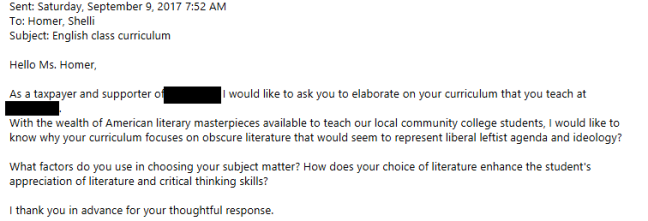
My chosen focus for the class in question is loosely based on an approach I have used before: Narratives of Historical Revision and Historical Recovery. I have written two PALS posts about texts I have taught in various versions of this course: M. NourbeSe Philip’s Zong! and Charles Chesnutt’s The Marrow of Tradition. This past semester, Chesnutt’s was not one of the texts under fire; though this email’s reference to literature appreciation took me back in my mind to my earlier Chesnutt piece. My most recent line up for this course, and the texts with which this citizen was concerned, was Audre Lorde’s Sister Outsider, M. NourbeSe Philip’s Zong!, Gloria Anzaldúa’s Borderlands/La Frontera, Luis Valdez’s Zoot Suit, and Benjamin Alire Sáenz’s Everything Begins and Ends at the Kentucky Club.
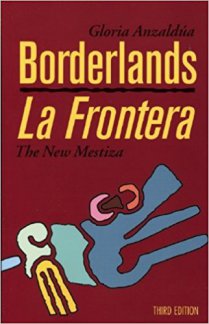
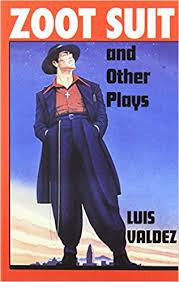
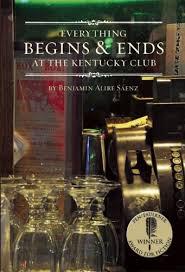
I thought about different possible responses to address this person’s inquiry, but there were too many factors involved. First, I was teaching 18 units, so all my extra time was already committed to my students. I didn’t have more than two minutes to commit to this odd interest in my course. Second, based on the rhetoric of this email, there isn’t a response I could have provided to appease the writer; going back to my first point, I didn’t have the time for the lengthy back-and-forth debate about my teaching choices that would almost inevitably ensue. Third, this person wasn’t actually interested in my course and didn’t have any knowledge of it. Finally, this email isn’t really about my class per se but about the larger backlash towards higher education.
So I chose not to respond.
Student ActivityInstead, I turned this email into a teachable moment because we just can’t get enough of those! In honor of the American Library Association’s Banned & Challenged Books Week, I put the content of the email up on the board for my students to respond to (and I removed all the sender’s identifying information, like I did here because I’m anti the practice of doxing). At this point in the semester, we had just finished reading the first two texts, the Lorde and the Philip.
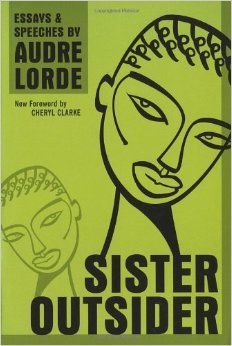
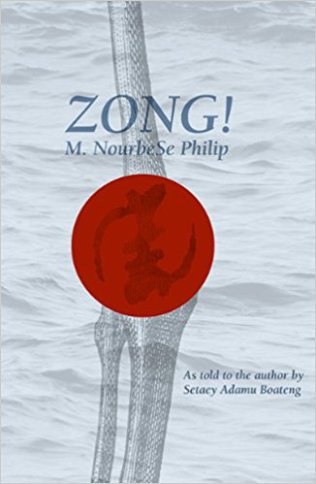
I asked them to:
My students had endless questions about the email to nearly all of which I answered, “I don’t know.” I did know, at least nothing beyond my own informed speculation. They wondered many of the same things I did. How did this person know what books we’re reading? Why would someone be so concerned about a college class they aren’t taking? But really, the questions suggest they don’t know what the class is about at all, so they can’t have the syllabus; where did they get the list of books from? Who has this much time on their hands? And my favorite, why you? Why are they trying to come after you of all teachers?
For the second question, the response was pretty standard across the board–Ahem. Thank you M. NourbeSe Philip. A paraphrase of all the responses goes something like, if this person had opened Zong!, they would not question how it promotes critical thinking. A direct quote from the in class discussion that was also shared by the room was “I have never thought about something so hard or so much in my life!” I also share those sentiments every time I read Zong! Always to my surprise, however, they also discussed how much they were learning about history. This is one of the purposes of my course focus, but I guess I am always hoping that at some point students will arrive from high school with more knowledge of these huge pieces of history like the middle passage.
Getting PoliticalMoving back to the first question, because this is where I would like to spend the remainder of this post, the responses varied much more. The similarities were that they spent a lot of picking apart of the email itself in an attempt to address the questions they had about why the person had written it in the first place. For instance, many students pointed out that it wasn’t an American literature course, so why would American classics be the go to texts? They were close reading (yay!) the email to try and figure out how much information its writer was working with.
Where the responses differed had to do with my students political identities and affiliations. I know! I have finally made it to the elephant in the room. This email was really all about politics. And by politics, we are talking about actual politics. When I wrote about Chesnutt as mentioned above, I framed it in terms of literature being political. That can be taken very literally by talking about political parties which sometimes fits the literature, but I normally approach it much more broadly which is how I have always interpreted the concept. This is what seems to be missing from one of the many current wars on education that has encouraged things like the Professor Watch List.
But what exactly was it about these texts that “represent [the] liberal leftist agenda and ideology” my emailer was so concerned about? All five writers were people of color. More than half of the writers identify as LGBQT. There are Lorde and Anzaldúa’s calls to fight the patriarchy. Author’s names and title words appear in languages other than English. The writers challenge dominant historical narratives. These are the assumptions that my more politically liberal students identified. Nearly all of these things would require more than just a glance at the course’s list of books. They would require a bit of research, wouldn’t they? Research where the emailer would also learn these books aren’t obscure and my teaching choices aren’t as radical as they are being treated in the email.
My politically conservative students’ responses were much more nuanced. They too were trying to process some of those go to assumptions, like writers’ race or sexuality being the emailers issue, but were filtering it through their own conservative identities. The challenge they faced, and still face, is America’s dominant two party system where conservative equals Republican and everything that stands for, while liberal equals Democrat and everything that stands for, despite the fight put forth by numerous other political parties. So my conservative students who support gay rights struggle with it positioned as liberal, which has been recorded more widely about the younger generation. And my conservative students who support DACA and clear paths to citizenship for immigrants of various documentation statuses struggle with the valuing of marginalized voices and experiences as liberal. These values are also apart of their conservative identities.
Ultimately my conservative students were, at the very least, annoyed that their agency was being taken away by the emailer. There were some hypothetical concessions in the form of, “yes, I guess Sister Outsider can be considered liberal because Lorde talks about her lesbian identity and the patriarchy a lot.” The follow ups to this were a whole bunch of buts: “but we aren’t mindless drones,” “but we are in college to be challenged,” “but our political positions aren’t being attacked,” “but we don’t have to agree with every single point; we’re just learning about other perspectives.”
I would place a large part of these students’ responses on who we were reading. Lorde and Anzaldúa are very friendly to readers; I mean, after rethinking the erotic with Lorde, they are ready to engage with her anger. The other part of students’ responses has to do with my pedagogy. I present them with the challenging texts and contextualize the material, but they have to figure out what to do with it.
Advertisements Share this:




